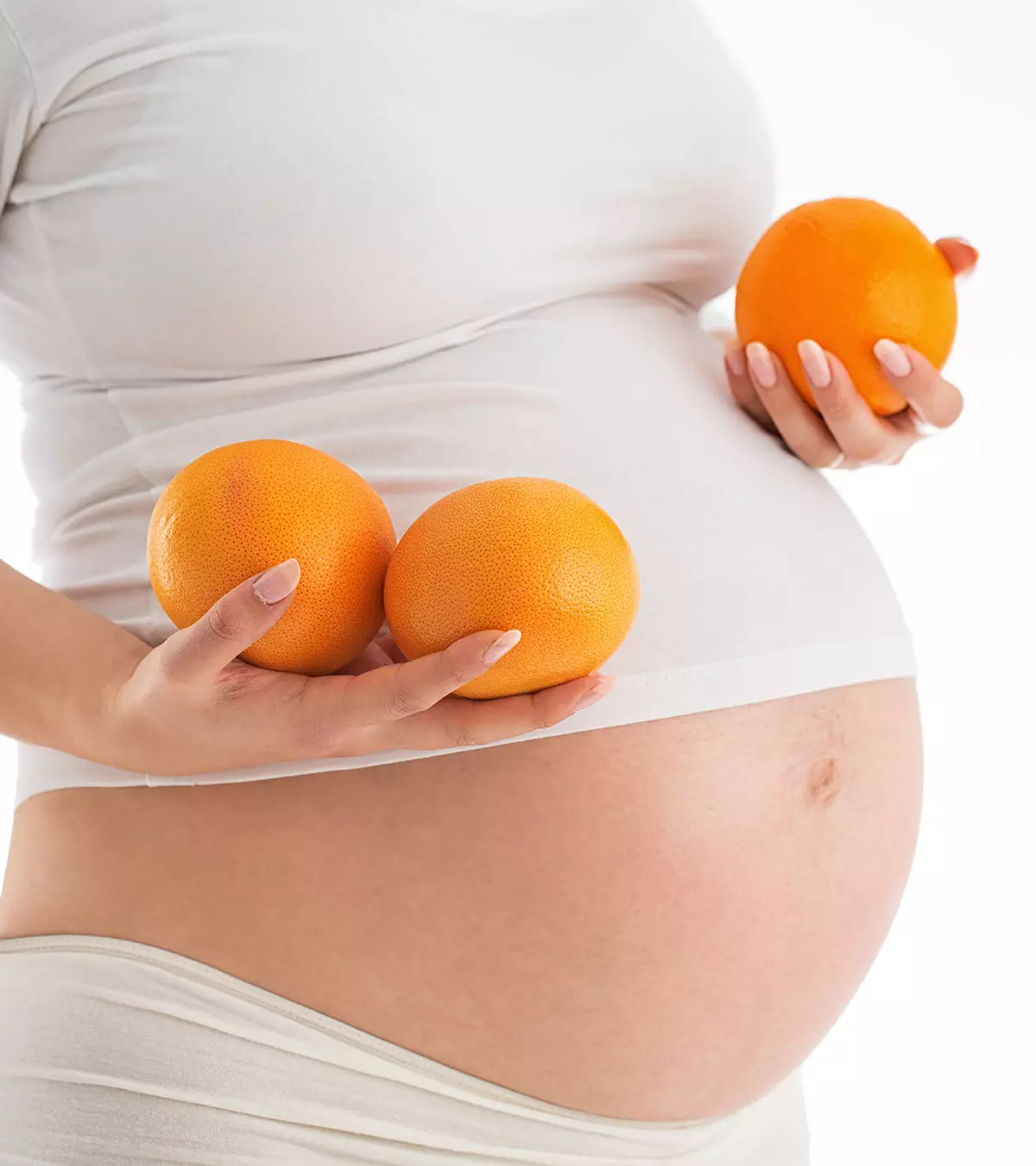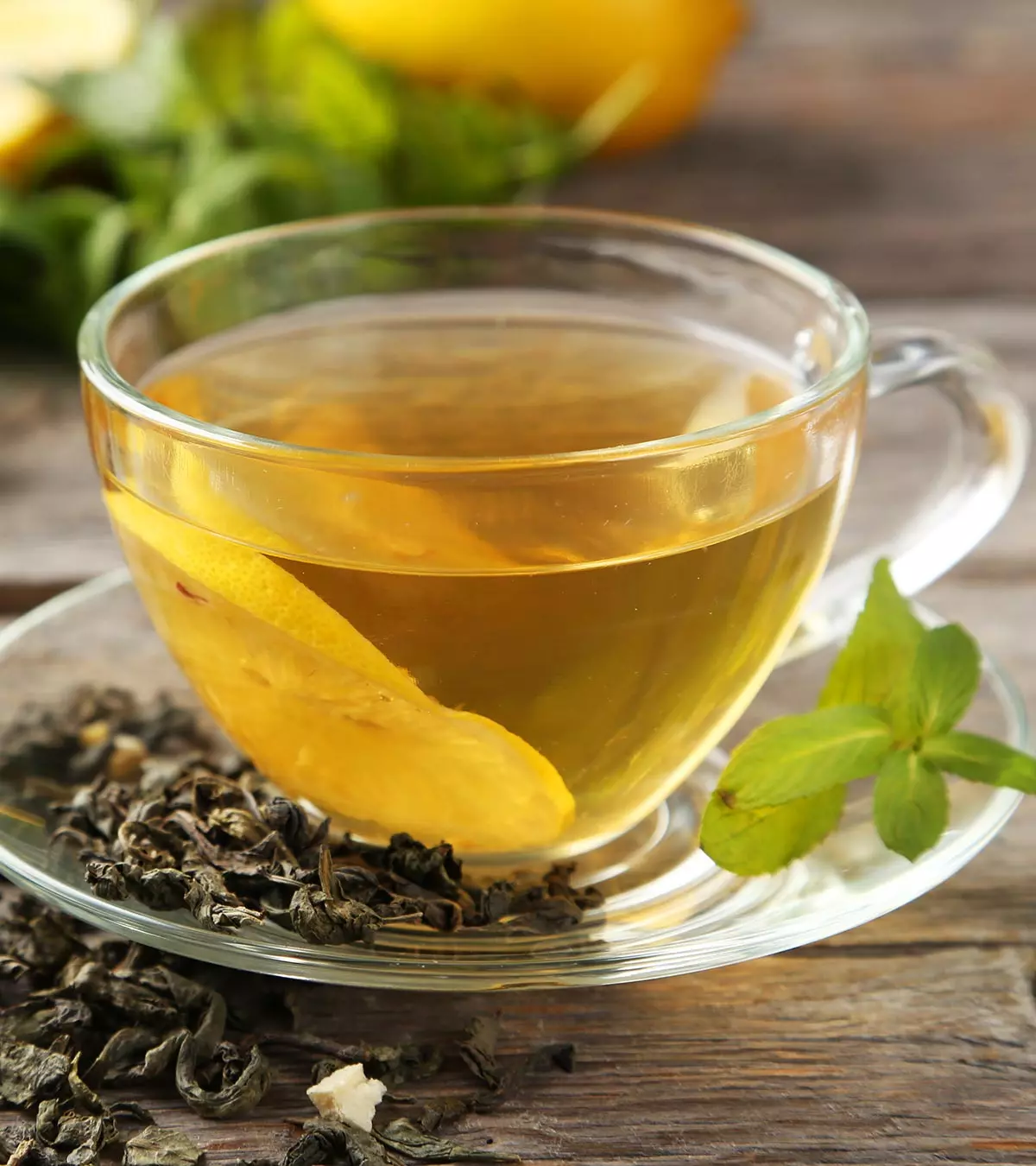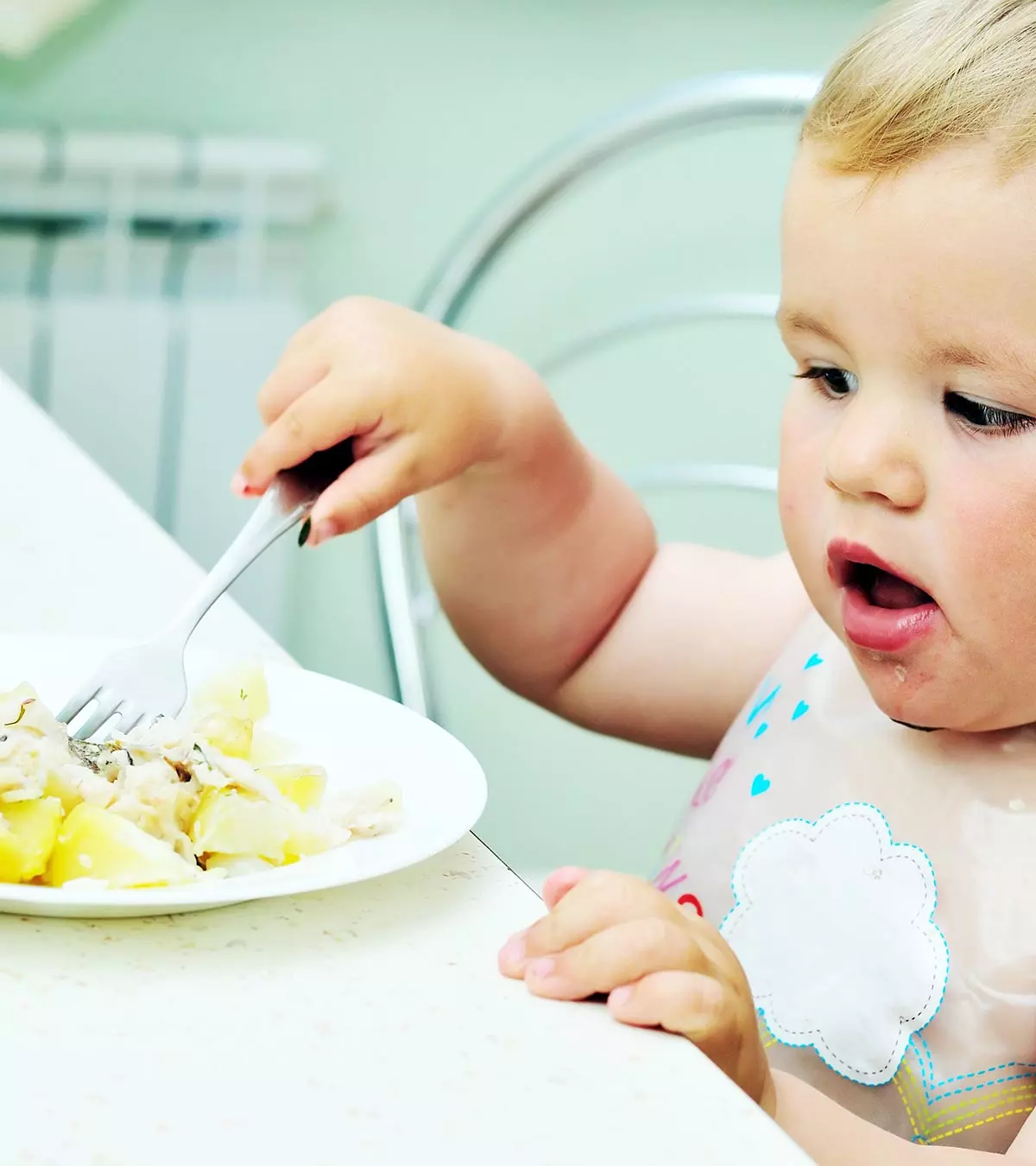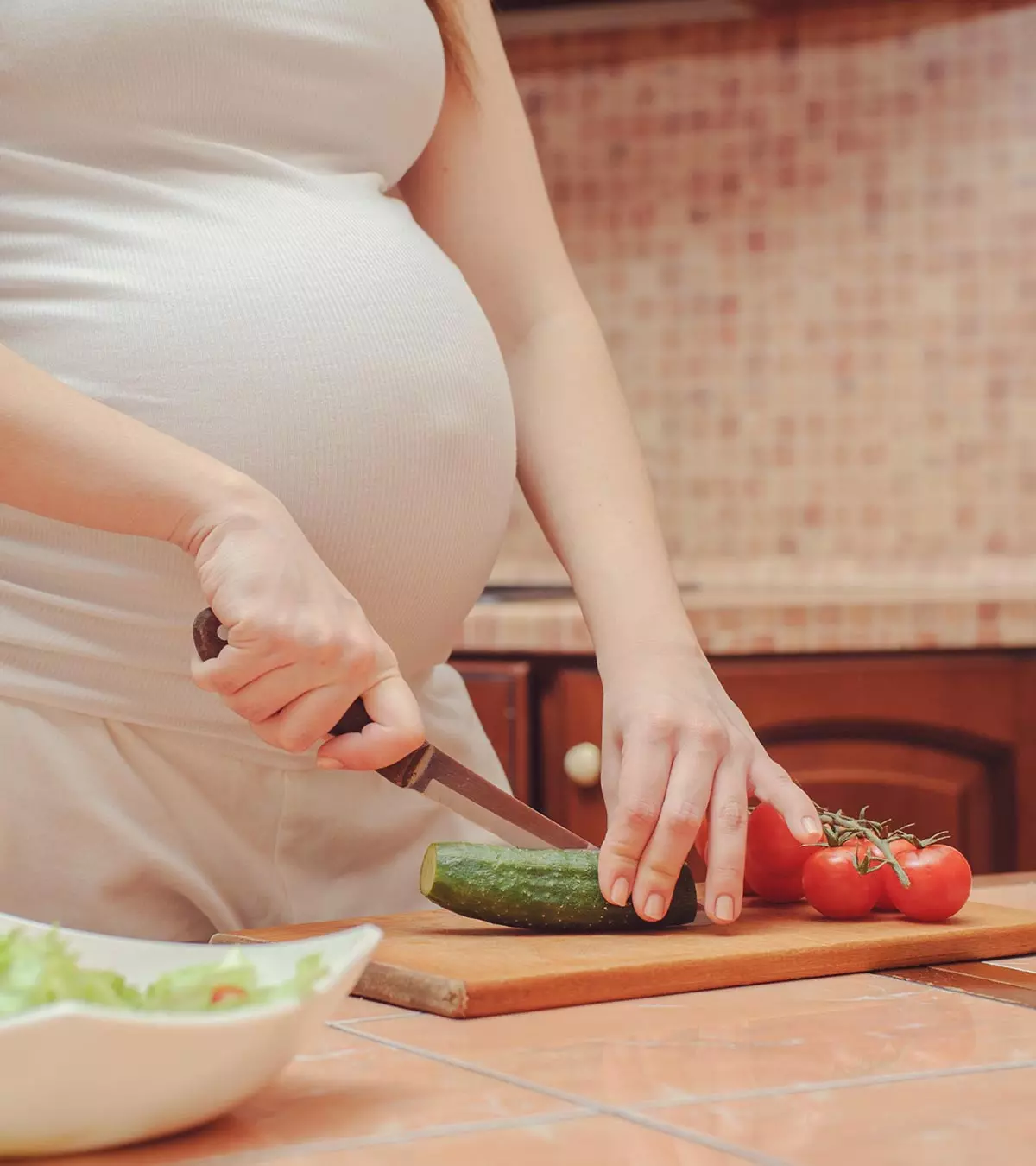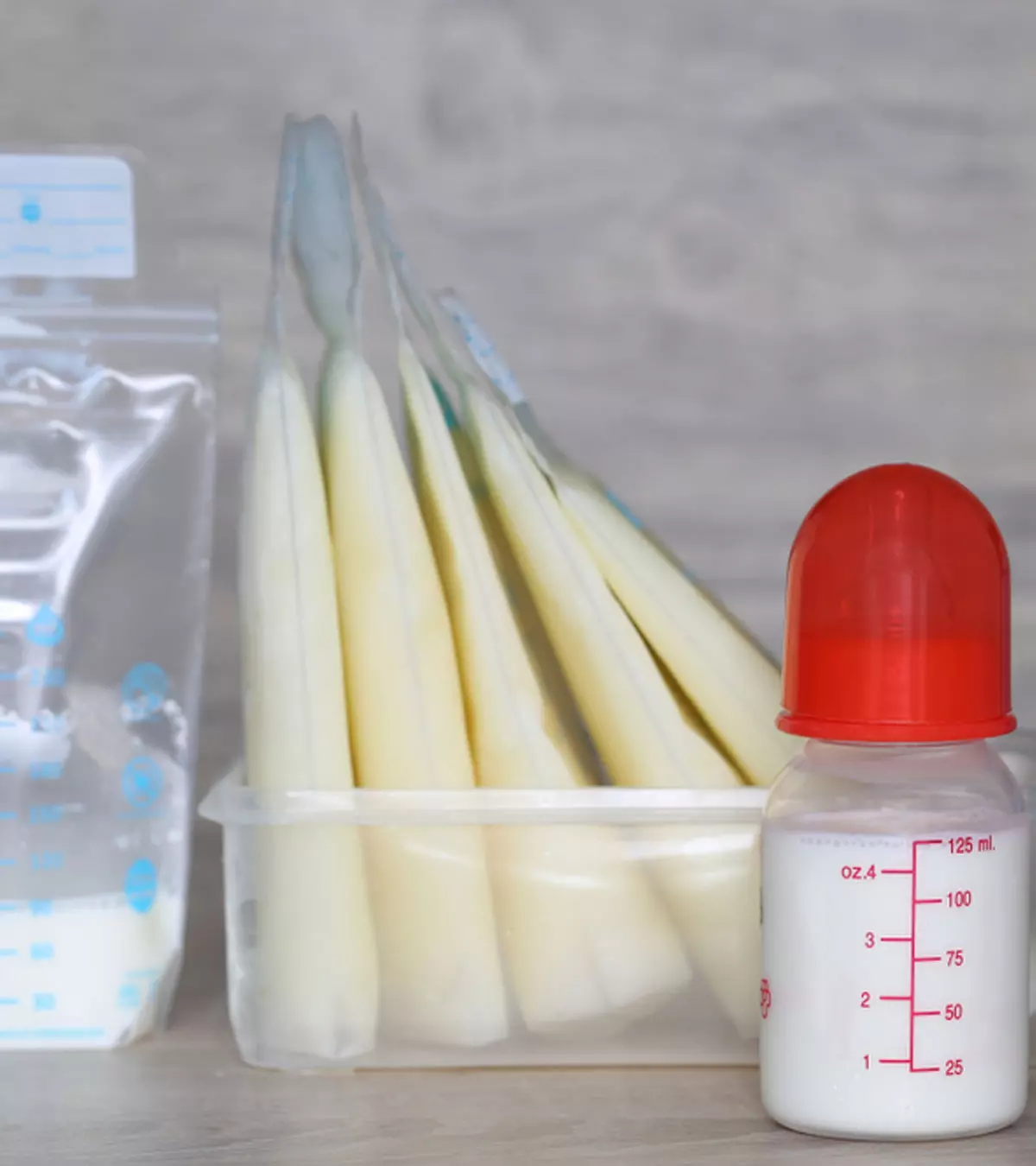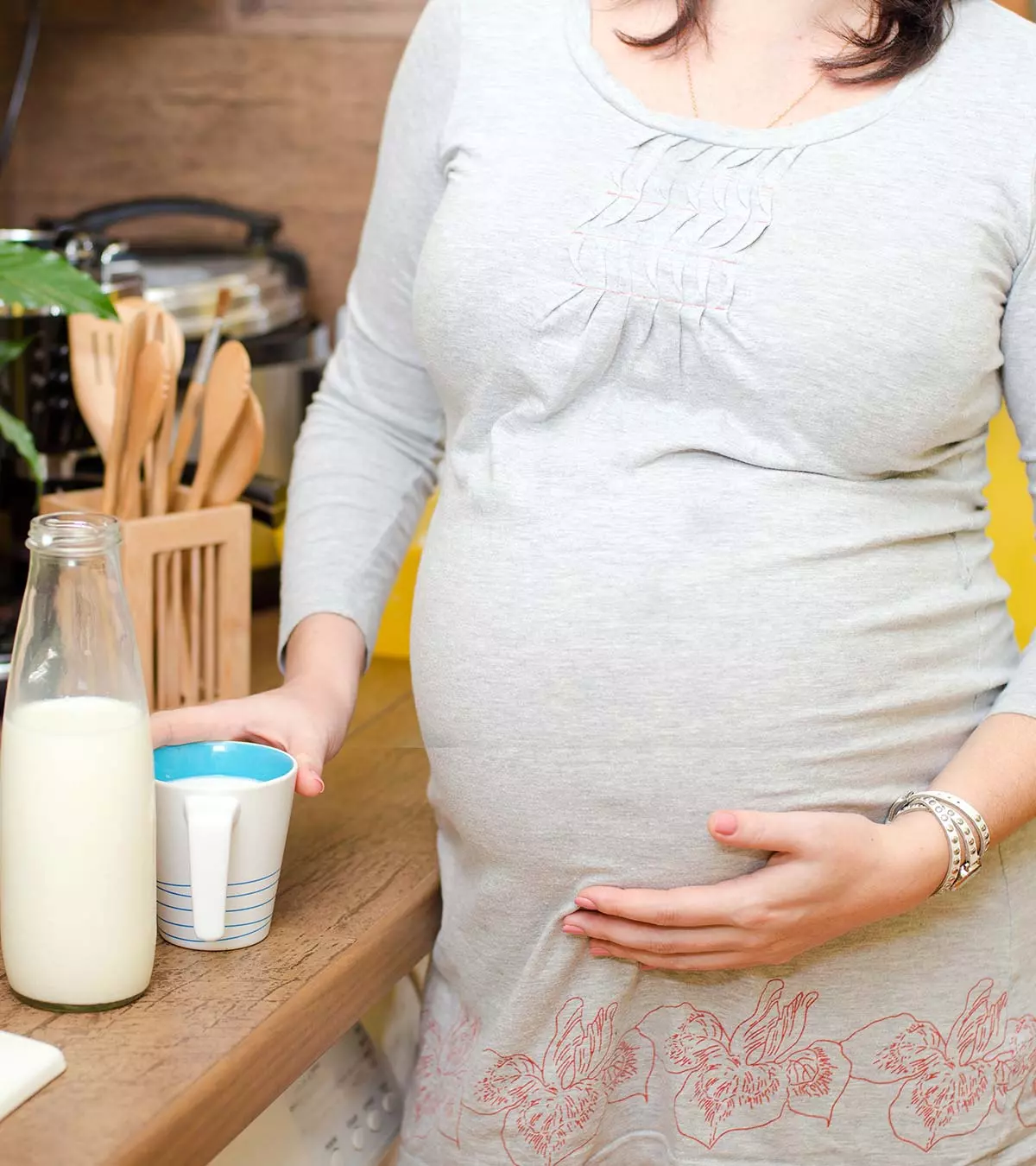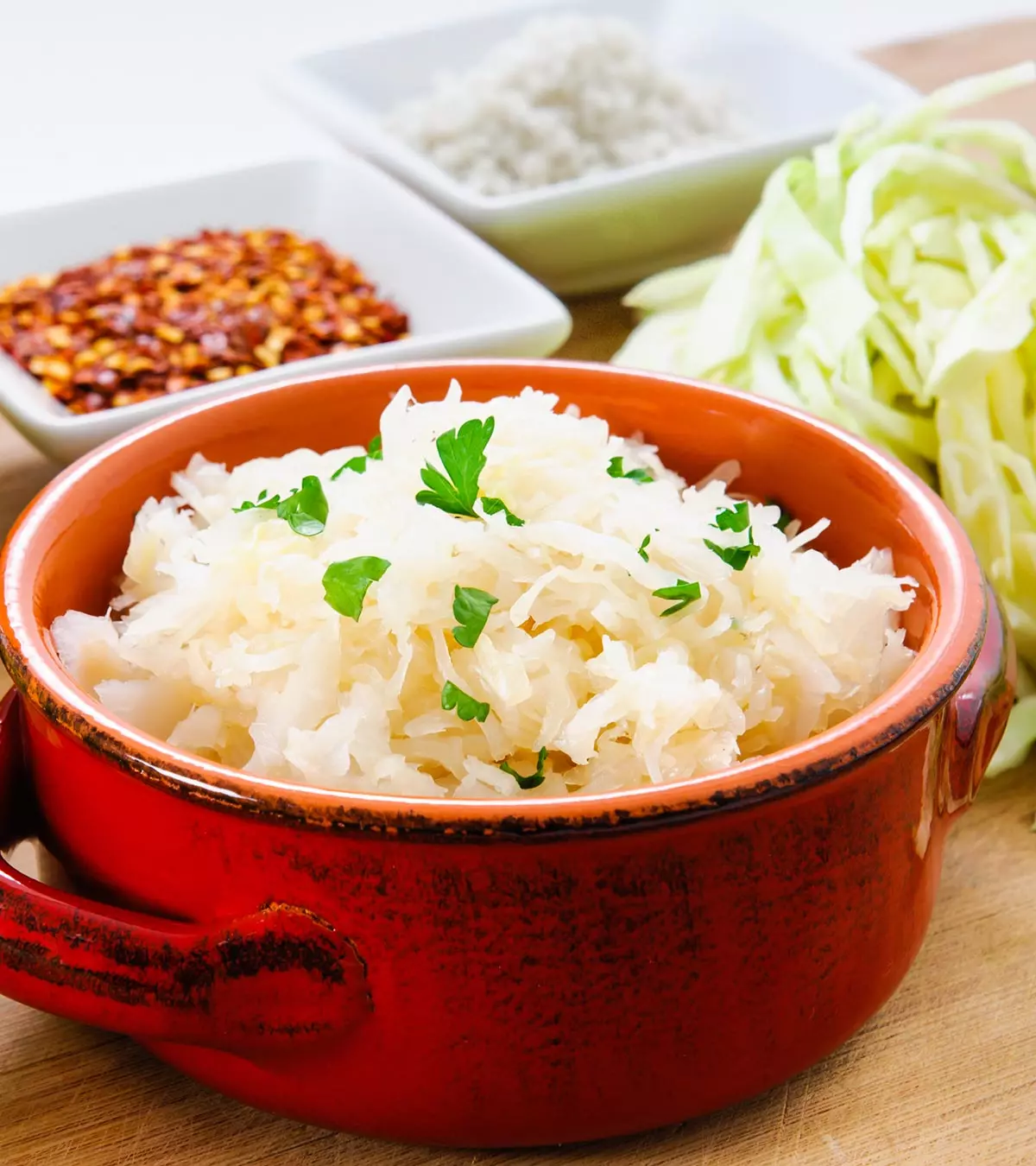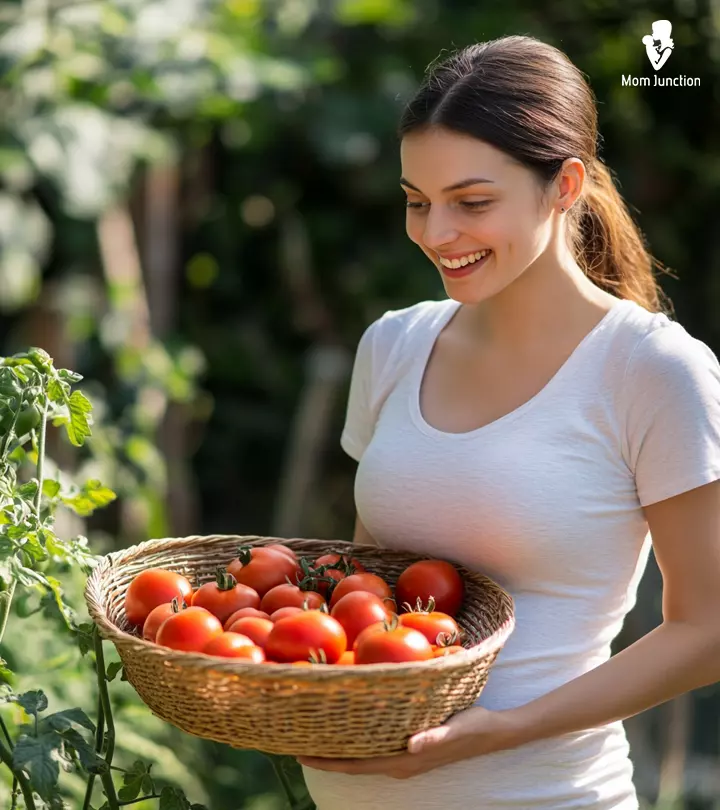
Image: Midjourney/ MomJunction Design Team
Juicy red tomatoes not only look and taste great but are also rich sources of vitamins and antioxidants. But is it a good idea to eat tomatoes during pregnancy? Before including any food in your pregnancy diet, you must ensure that it is safe for the baby growing in your womb. Read this post to know whether or not consuming tomatoes is safe for expectant mothers. We also discuss the health benefits of the vegetable, which is technically a fruit, ways to include it in your regular diet, and the risks, if any.

Key Pointers
- Tomatoes are an excellent source of Vitamin A, C, and folate, lycopene, and iron, which help keep your fetus healthy.
- Tomatoes’ rich calorie count and high levels of fiber provide energy and aid in digestion.
- Regular consumption of tomatoes can reduce the risk of hypertension and improve blood flow. They are also known to increase hemoglobin levels in anemic women.
- Overconsumption of tomatoes can cause heartburn due to their high acidic content, gas, and stomach pain.
- When choosing tomatoes, select bright, red-colored ones with no blemishes that are neither too soft nor too hard. Denser tomatoes are usually more juicy.
- Tomatoes can be eaten raw by adding them to salads or cooked in the form of soups and Indian curries.
Is It Safe To Eat Tomatoes During Pregnancy?
Yes. During pregnancy, it’s alright to eat tomatoes in moderation as they provide important nutrients such as vitamins A, C, and folate, as well as lycopene and iron, which help the health of both mom and baby. You can eat tomatoes in cooked or canned forms and as part of dishes or salads.
Vitamin C in tomatoes helps with the absorption of iron, a vital nutrient for pregnant women. If your doctor suggests iron supplements, including tomatoes in your diet could potentially improve the absorption (1).
 Quick fact
Quick factWhat Are The Benefits Of Eating Tomatoes During Pregnancy?
Tomatoes are tasty and provide multiple benefits when taken as a part of your healthy-eating diet plan.
1. Vitamins A and C
One medium-sized tomato gives almost 40% recommended daily allowance (RDA) of vitamin C and 20% RDA of vitamin A. It also contains vitamin K, potassium, iron, and calcium, all of which are important for healthy fetal development (2).
2. Hydration
Tomatoes are high in water content, with 100g containing approximately 94.5g of water (2). Consuming tomatoes as a part of a well-balanced diet may help lower your risk of dehydration and water retention.
3. Fiber
Tomatoes contain high levels of dietary fiber, which aids in healthy digestion. The fiber bulks up the stools, promotes peristaltic movements of the smooth digestive muscles, and stimulates digestive juices (3).
4. Potassium
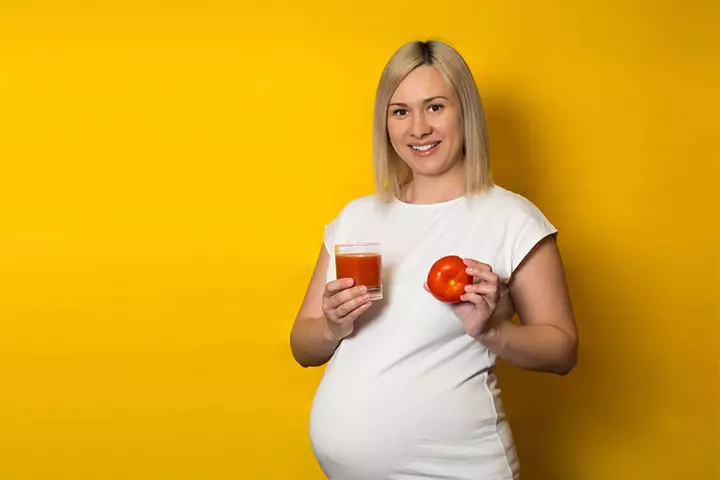
Regular consumption of tomatoes can reduce the risk of hypertension, i.e., preeclampsiaiA pregnancy disorder characterized by high blood pressure, water retention, and protein content in urine , which is common during pregnancy. Potassium improves the blood flow and reduces the stress on the heart (4).
5. Antioxidants
Tomatoes are packed with lycopene, an antioxidant that helps in fighting cancer-causing radicals (5). Lycopene is also known for its anti-inflammatory properties, which can help lower the chances of heart disease. Furthermore, it boosts the immune system, helping the body resist common infections like colds and the flu (6).
6. Lowers cholesterol
Lycopene prevents oxidation of the serum lipids to protect the heart. It helps reduce the levels of LDL cholesterol and triglyceridesiA fat in the blood that helps provide energy to your body in the blood (7).
7. Folic acid
Tomatoes help you meet the RDA of folic acid. Folic acid is required to reduce the risk of birth defects in the brain and spinal cord in babies (8).
9. Vitamin E
Topical application of tomato juice, which has vitamin E, which may help protect against sunburns (9). If you are still not convinced about the goodness of tomatoes or not sure how much to consume every day, read on to know about how nutritious the plum-looking vegetable is.
 Quick fact
Quick factCan Tomatoes Help Manage Gestational Diabetes?
Tomatoes can help reduce your blood sugar levels because of an active substance, lycopene, in them. This carotenoid gives tomatoes a red color and helps lower blood sugar by making your body more responsive to insulin. Tomatoes have around three times more lycopene than other fruits and veggies.
Studies found a significant reduction in sugar levels after consuming tomato juice. For added benefits, consider canned tomatoes. They’re a better way to get lycopene than fresh tomatoes because the canning process breaks down some rigid cell walls, releasing lycopene and allowing the body to absorb it quickly. However, you should check with your nutritionist to understand the safe dosage of tomatoes or juice to enjoy its benefits (10).
 Research says
Research saysNutritional Value Of Tomatoes
The nutrient value of red, ripe or raw tomatoes per 100gm serving is as follows (11):
| Nutrient | Amount |
|---|---|
| Calories | 18kcal |
| Carbohydrates | 3.89g |
| Fiber | 1.2g |
| Vitamins | |
| Folic acid | 15mcg |
| Vitamin A | 833IU |
| Vitamin C | 13.7mg |
| Electrolytes | |
| Potassium | 237mg |
| Sodium | 5mg |
| Minerals | |
| Calcium | 10mg |
| Magnesium | 11mg |
| Phosphorus | 24mg |
Tomatoes are highly nutritious and healthy, but it does not mean you should overindulge in them.
What Are The Possible Risks Of Overeating Tomatoes In Pregnancy?

Hannah Whittaker, RD, PGDip, a specialist pediatric and pregnancy dietitian from Liverpool, England, says, “Tomatoes are classified as an acidic food and can make reflux or heartburn worsen. I would always advise you to monitor the number of tomatoes that you eat and only eat them as part of a balanced diet.”
Excess consumption of any food item can backfire. This applies to tomatoes as well. Eating one too many tomatoes can lead to:
- Heartburn because of the vegetable’s acid content (12)
- Digestion problems such as gas and stomach pain (13)
You may be more likely to develop a tomato allergy if you have a grass pollen allergy (14). It’s advisable to consult your doctor before including tomatoes in your pregnancy diet.
Now that you know why you should eat tomatoes and how much to eat, let’s see how to pick the right tomatoes.
How To Choose Tomatoes?
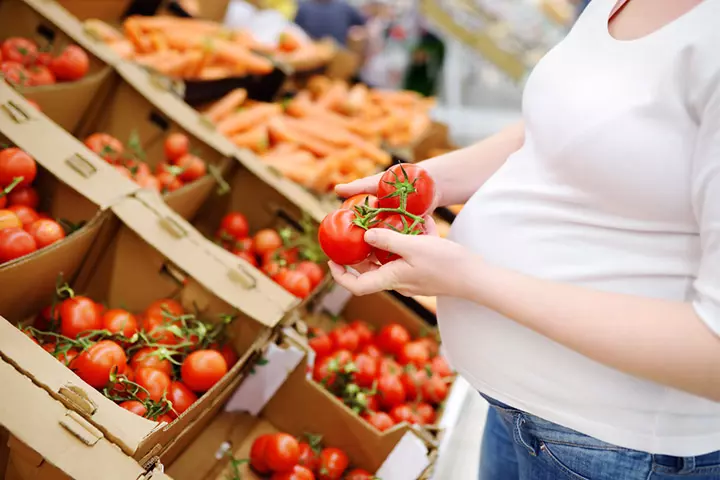
It is important to choose the right tomatoes to enjoy the benefits they offer (15).
- Look for bright red colored tomatoes with no bruises, blemishes or black spots. Dull or pale varieties will not have any flavor.
- Go for vine-ripened varieties obtained directly from the farmers market and for those free of chemicals.
- It should neither be too soft nor too hard.
- Go for the heavier and denser tomatoes as they are juicy.
- You can figure out the flavor by smelling the stem. It should ideally be sweet, strong and earthy.
Ways To Include Tomatoes In A Pregnancy Diet
Tomatoes add a unique flavor to a dish. Here is how you can use them in your diet for taste and health.
- Raw tomatoes can be added to salads.
- They are primarily the ingredients in many Indian curries and purees.
- Tomato soup can be a healthy alternative to a meal.
- Tomato juice is an excellent snack or breakfast option to keep you fresh.
- Sliced tomato can be used in sandwiches.
- Combine diced tomatoes with onions and lime juice to make a fresh salsa.
- Homemade ketchup with tomatoes can be yummy!
- Sun-dried and grilled tomatoes are a part of continental recipes.
- Enjoy cherry tomatoes as a quick and healthy snack.
Combining tomatoes with other fruits or vegetables that have similar flavors can create delightful and healthy snacks. Moniisza, a mother and vlogger, shares one of her favorite vegan snacks, which she prepares using tomatoes. She says, “Here’s a quick and savory snack: I love tomatoes and olives. I know not everyone likes olives. If you’re not vegan, you can replace them with feta cheese, but I love this combination (i).”
Here are a few pregnancy-friendly tomato recipes you can try:
1. Tomato soup
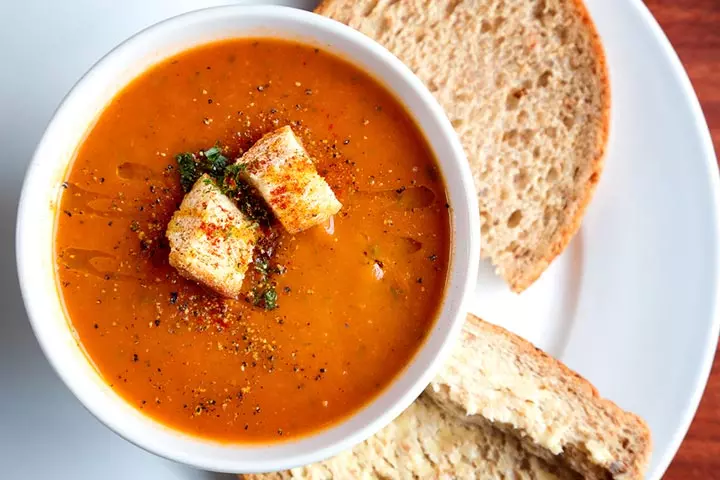
You will need:
- 5 cups chopped tomatoes
- ¼ cup split yellow gram
- ½ cup onions, finely chopped
- 1tsp low-fat butter
- ½ cup low-fat milk
- 2tsp sugar
- 1tsp black pepper, freshly ground
How to:
- Add four cups of water, tomatoes and split yellow gram to a non-stick saucepan.
- Cook over medium heat for eight to ten minutes until the tomatoes turn soft.
- Turn off the flame and keep the saucepan aside.
- Blend everything to form a smooth liquid. Keep aside.
- Take the same non-stick saucepan, add butter and onions. Sauté until they turn light brown.
- Add blended mixture, low-fat milk, sugar, salt and pepper. Mix well.
- Let it boil while stirring continuously. Simmer for five minutes.
- Serve hot with toasted whole wheat bread croutons.
Preparation time:
55 minutes
Servings: 4
 Quick tip
Quick tip2. Tomato relish
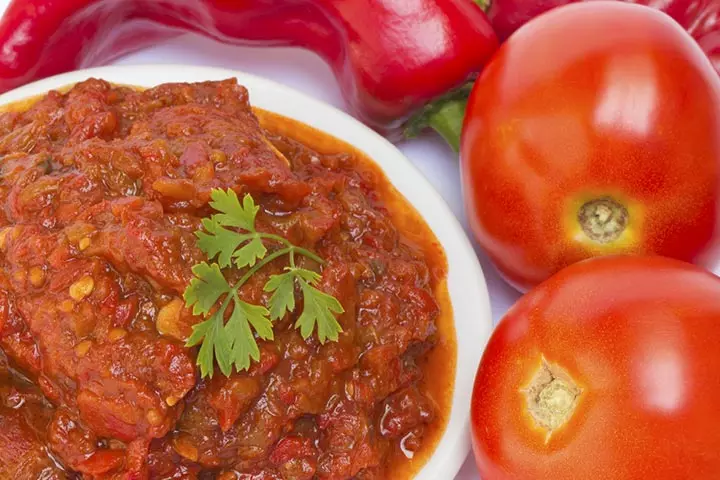
You will need:
- 2 tomatoes, finely chopped
- 3tbsp oil
- 1 onion, finely sliced
- 1 red chili, finely chopped
- 1 garlic clove
- 2tbsp vinegar
- 1/4tsp salt
- A pinch of black pepper, freshly ground
- 2tsp sugar
- Fresh coriander
How to:
- Heat oil in a pan, and add onion, chili, and garlic. Cook them until they turn soft.
- Add tomatoes and mix properly.
- Add vinegar and sugar and let the mixture boil. Let it simmer for 30 minutes.
- Add salt and ground pepper and check for the consistency of jam.
- Turn off the flame and season the relish with coriander.
Preparation time:
10 to 30 minutes
Servings: 4 to 6
3. Stuffed tomato
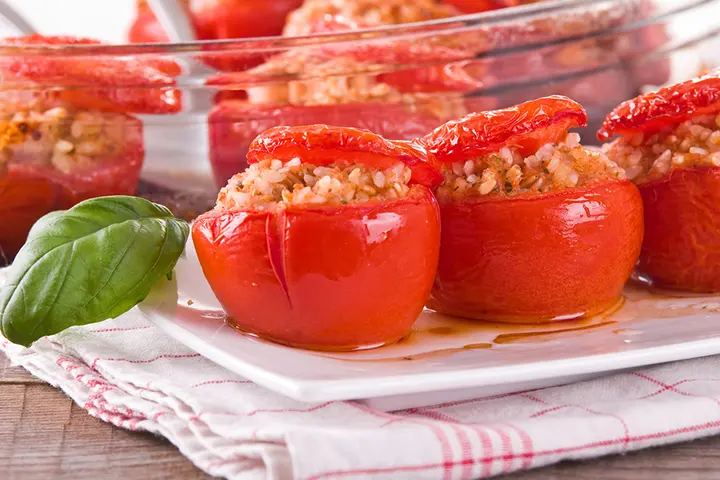
You will need:
- 6 medium tomatoes
- ½ cup paneer (cottage cheese) crumbled
- ½ cup of mixed boiled vegetables (such as peas, carrots, and beans)
- ½ cup finely chopped onions
- 2 green chilies, finely chopped
- 2tsp oil
- Salt
How to:
- Chop the tops of the tomatoes and scoop out the insides. Set the scooped tomato aside.
- Heat oil in a pan, add onions and cook until soft. Stir in chopped green chilies and saute for a minute.
- Add boiled mixed vegetables, paneer, salt, and the reserved tomato pulp. Cook for two minutes until combined.
- Stuff the hollowed tomatoes with the mixture. Preheat the oven to 200°C (400°F) and bake the stuffed tomatoes on a tray for 20 minutes or until tender.
- Serve warm and enjoy!
Preparation time:
20 to 30 minutes
Servings: 3 to 4
Next, we answer a few commonly asked questions about eating tomatoes when pregnant.
Frequently Asked Questions
1. Is it safe to consume tomato juice during pregnancy?
Yes, it is safe to consume tomato juice during pregnancy as it is rich in vitamin C. According to experts, expecting moms need vitamin C during pregnancy for several physiological functions, including proper fetal development and better iron absorption. It improves the energy levels and lowers weakness. It also purifies the blood and helps in reducing high blood pressure (16). So, it is believed to be beneficial for maternal health.
2. Is it safe to eat canned tomatoes during pregnancy?
It is not safe to eat canned tomatoes as they are prone to attracting bacteria, which could lead to botulism and other bacterial infections. Canned foods are processed to extreme temperatures to kill microbes, a process that destroys the nutrients and enzymes in the tomatoes. Moreover, food can linings contain a toxic substance known as bisphenol A (BPA)iA chemical compound primarily used in the production of various plastic and lining of cans , which is dangerous for both the mother and the fetus (17).
3. Can I eat tomato ketchup or sauce during pregnancy?
Tomato ketchup and sauce are safe during pregnancy as long as they are taken in moderation. There was a concern about the presence of Monosodium Glutamate (MSG)iA flavor enhancer used in restaurants and packaged foods and naturally found in tomatoes and cheese in these food items. However, MSG has since acquired a GRAS (generally regarded as safe) status, so consuming packaged tomato sauce and ketchup is alright unless consumed excessively (18).
4. Why am I craving tomatoes?
Whittaker suggests, “Tomatoes are little powerhouses of vitamins, minerals, and antioxidants, and it may be due to a nutritional deficiency that you are craving them. There is also some evidence to suggest that craving tomatoes may be a sign of iron deficiency. It is common for women to be averse to iron-rich foods during pregnancy and nausea. Tomatoes are also 95% water, and for this reason, you may be looking for ways to hydrate.”
5. Does craving tomatoes during pregnancy tell something about a baby’s gender?
According to old wives tales, a craving for sour foods such as tomatoes can indicate that you are carrying a boy. However, it is just one of the many ways to guess the sex of the unborn child, although not a reliable one.
6. Can tomatoes cause constipation during pregnancy?
Due to their abundant dietary fiber content, tomatoes are unlikely to cause constipation during pregnancy. A cohort-based study found that tomatoes are among pregnant women’s most commonly consumed fiber-rich foods that may aid in constipation prevention (21).
7. Can I eat cherry tomatoes while pregnant?
Moderate consumption of cherry tomatoes during pregnancy may not pose any health risks. It is always best to consult with your healthcare provider for personalized advice.
8. Can eating tomatoes cause miscarriage?
Tomatoes are generally considered safe for consumption during pregnancy and are not known to cause miscarriage. However, proper washing and handling of tomatoes properly is essential to reduce the risk of foodborne illness, which can adversely affect pregnancy (22).
9. Can I eat fried tomatoes while pregnant?
Moderate consumption of fried tomatoes is generally considered safe during pregnancy. Overconsumption of fried foods during pregnancy may increase the risk of pregnancy-related complications (23).
Unlike many other fruits and vegetables, tomatoes can be used in many different ways to improve the flavor of almost any meal. You can make salad, soup, juice, curries, and many other meals using tomatoes to meet your nutrient requirements. Having tomatoes during pregnancy as part of a prenatal care diet plan is safe as it contains vitamins, folate, iron, and others which enhance both mother and baby’s health. However, like with any other food during pregnancy, tomatoes should also be consumed in moderation. Moreover, it is suggested to select fresh, bright red-colored tomatoes rather than those that have been kept or canned.
Infographic: Ways To Include Tomatoes In A Pregnancy Diet
Tomatoes not only make our pizza and pasta taste better but also impart several benefits to the body. If you are looking for other ways of consuming this fruit while ditching pizza and pasta, we suggest you read the following infographic. Here, you will find a list of alternative ways to include tomatoes in your daily diet and get their nutrition. Illustration: Momjunction Design Team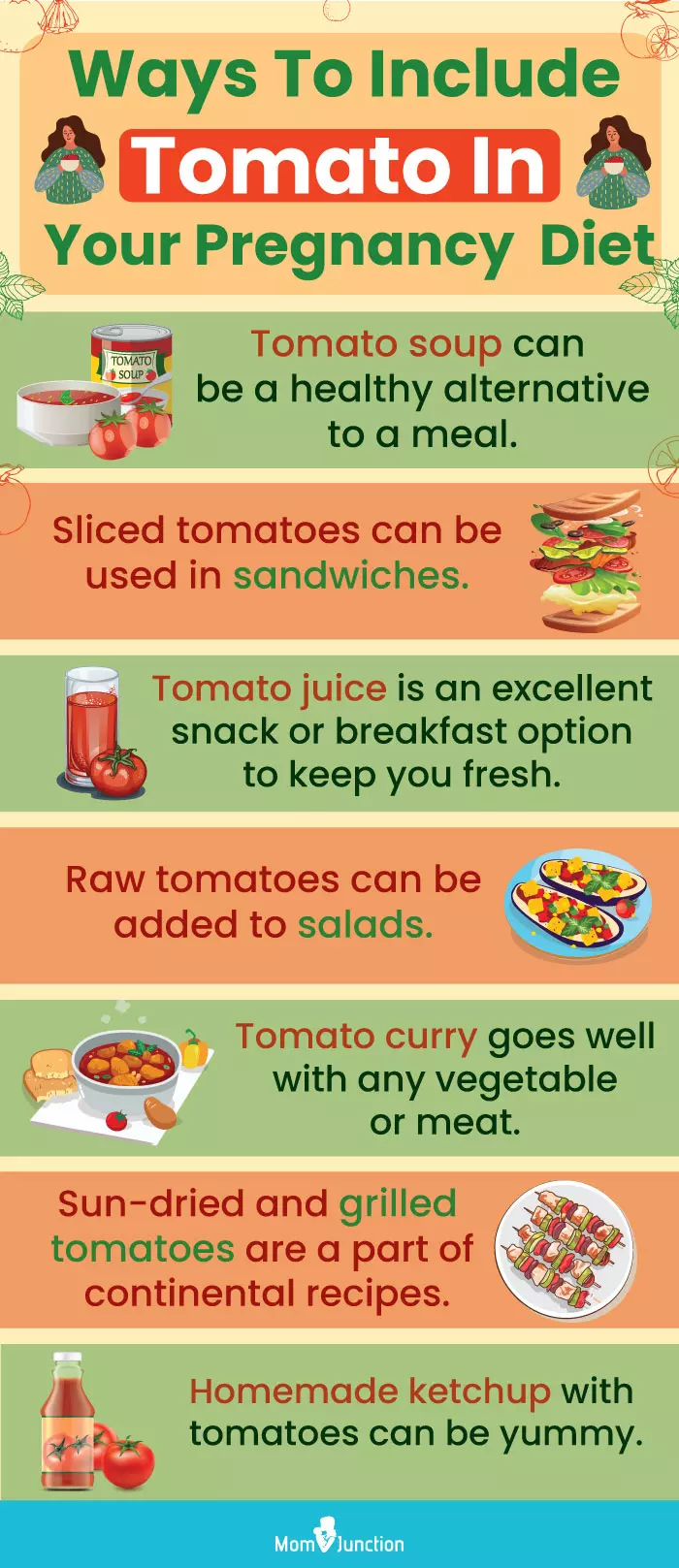
Illustration: Tomatoes During Pregnancy: Possible Benefits And Risks
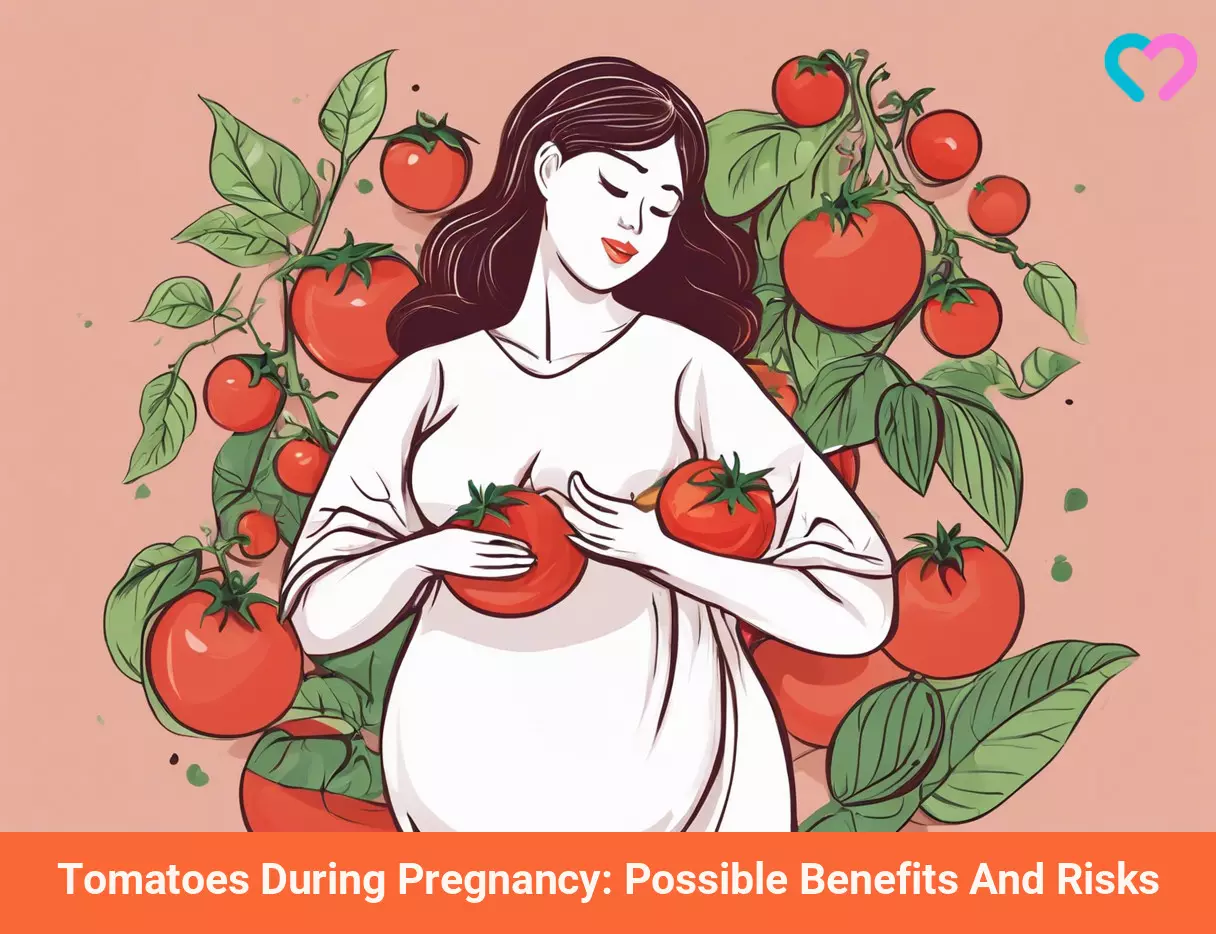
Image: Stable Diffusion/MomJunction Design Team
Personal Experience: Source
MomJunction articles include first-hand experiences to provide you with better insights through real-life narratives. Here are the sources of personal accounts referenced in this article.
i. 10 Vegan Snacks I Love While Pregnant;https://www.youtube.com/watch?v=HJ3Tbr0PbYk
References
- Healthy eating during pregnancy
https://www.healthdirect.gov.au/foods-high-in-iron - Tomatoes raw
https://fdc.nal.usda.gov/fdc-app.html#/food-details/1103276/nutrients - Dietary Fiber
https://extension.colostate.edu/docs/pubs/foodnut/09333.pdf - Nahida Tabassum and Feroz Ahmad; (2011); Role of natural herbs in the treatment of hypertension
https://www.ncbi.nlm.nih.gov/pmc/articles/PMC3210006/ - Tasty Tomatoes: Anti-Cancer Attributes & A Healthy Recipe
https://www.nfcr.org/blog/tasty-tomatoes-anti-cancer-attributes-healthy-recipe/ - 4 Foods That Boost Your Immune System
https://valleycommunityhealthcare.org/4-foods-that-boost-your-immune-system/#:~:text - Joye K Willcox et al.; Tomatoes and cardiovascular health
https://pubmed.ncbi.nlm.nih.gov/12587984/ - Folic Acid: the Vitamin That Helps Prevent Birth Defects
https://www.health.ny.gov/publications/1335/ - Silke K. Schagen et al.; (2012); Discovering the link between nutrition and skin aging
https://www.ncbi.nlm.nih.gov/pmc/articles/PMC3583891/ - Herri Novita Br. Tarigan et al.;(2019); The Impact of Tomato Juice on Reducing Blood Sugar Levels at Diabetes Mellitus Patients
https://www.scitepress.org/Papers/2019/94728/94728.pdf - Tomatoes raw
https://fdc.nal.usda.gov/fdc-app.html#/food-details/1103276/nutrients - Gastroesophageal reflux: More than just heartburn
https://www.health.harvard.edu/newsletter_article/Gastroesophageal_reflux_More_than_just_heartburn - Symptoms & Causes of Indigestion
https://www.niddk.nih.gov/health-information/digestive-diseases/indigestion-dyspepsia/symptoms-causes - Oral Allergy Syndrome (OAS)
https://allergyasthmanetwork.org/health-a-z/oral-allergy-syndrome/ - Choosing the Right Tomato
https://growappalachia.berea.edu/2017/05/18/choosing-right-tomato/ - Tamami Odai et al.; (2019); Unsalted tomato juice intake improves blood pressure and serum low-density lipoprotein cholesterol level in local Japanese residents at risk of cardiovascular disease.
https://onlinelibrary.wiley.com/doi/full/10.1002/fsn3.1066 - Protect your baby from BPA (Bisphenol A)
https://www.mass.gov/info-details/protect-your-baby-from-bpa-bisphenol-a - Questions and Answers on Monosodium glutamate (MSG)
https://www.fda.gov/food/food-additives-petitions/questions-and-answers-monosodium-glutamate-msg - How to Treat Iron Deficiency During Pregnancy
https://americanpregnancy.org/healthy-pregnancy/pregnancy-health-wellness/treat-iron-deficiency-naturally-pregnancy/ - Yuhendri Putra et al.; (2025); Effects of Tomato Juice and Honey on Haemoglobin Level of Pregnant Women
https://www.atlantis-press.com/proceedings/sesicnimph-21/125962059 - Rachelle A Pretorius and Debra J Palmer; (2025); High-Fiber Diet during Pregnancy Characterized by More Fruit and Vegetable Consumption
https://pmc.ncbi.nlm.nih.gov/articles/PMC7824257/ - Food safety tips for tomatoes.
https://www.canada.ca/en/health-canada/services/food-safety-fruits-vegetables/tomatoes.html - Citlalli Osorio-Yáñez et al.; (2018); Maternal Intake of Fried Foods and Risk of Gestational Diabetes Mellitus
https://www.ncbi.nlm.nih.gov/pmc/articles/PMC5578760/ - Edward J Collins et al.; (2025); Tomatoes: An Extensive Review of the Associated Health Impacts of Tomatoes and Factors That Can Affect Their Cultivation
https://pmc.ncbi.nlm.nih.gov/articles/PMC8869745/
Community Experiences
Join the conversation and become a part of our nurturing community! Share your stories, experiences, and insights to connect with fellow parents.
Read full bio of Jyoti Benjamin

Juicy red tomatoes not only look and taste great but are also rich sources of vitamins and antioxidants. But is it a good idea to eat tomatoes during pregnancy? Before including any food in your pregnancy diet, you must ensure that it is safe for the baby growing in your womb. Read this post to know whether or not consuming tomatoes is safe for expectant mothers. We also discuss the health benefits of the vegetable, which is technically a fruit, ways to include it in your regular diet, and the risks, if any.
[mj-toc]
Key Pointers
- Tomatoes are an excellent source of Vitamin A, C, and folate, lycopene, and iron, which help keep your fetus healthy.
- Tomatoes' rich calorie count and high levels of fiber provide energy and aid in digestion.
- Regular consumption of tomatoes can reduce the risk of hypertension and improve blood flow. They are also known to increase hemoglobin levels in anemic women.
- Overconsumption of tomatoes can cause heartburn due to their high acidic content, gas, and stomach pain.
- When choosing tomatoes, select bright, red-colored ones with no blemishes that are neither too soft nor too hard. Denser tomatoes are usually more juicy.
- Tomatoes can be eaten raw by adding them to salads or cooked in the form of soups and Indian curries.
Is It Safe To Eat Tomatoes During Pregnancy?
Yes. During pregnancy, it's alright to eat tomatoes in moderation as they provide important nutrients such as vitamins A, C, and folate, as well as lycopene and iron, which help the health of both mom and baby. You can eat tomatoes in cooked or canned forms and as part of dishes or salads.
Vitamin C in tomatoes helps with the absorption of iron, a vital nutrient for pregnant women. If your doctor suggests iron supplements, including tomatoes in your diet could potentially improve the absorption (1).
[mj_protip type="Quick fact" title="Quick fact"]Adding vitamin C-rich tomatoes is essential for vegetarians and vegans as they cannot absorb iron from plant sources as efficiently as from meat (19).[/mj_protip]
What Are The Benefits Of Eating Tomatoes During Pregnancy?
Tomatoes are tasty and provide multiple benefits when taken as a part of your healthy-eating diet plan.
1. Vitamins A and C
One medium-sized tomato gives almost 40% recommended daily allowance (RDA) of vitamin C and 20% RDA of vitamin A. It also contains vitamin K, potassium, iron, and calcium, all of which are important for healthy fetal development (2).
2. Hydration
Tomatoes are high in water content, with 100g containing approximately 94.5g of water (2). Consuming tomatoes as a part of a well-balanced diet may help lower your risk of dehydration and water retention.
3. Fiber
Tomatoes contain high levels of dietary fiber, which aids in healthy digestion. The fiber bulks up the stools, promotes peristaltic movements of the smooth digestive muscles, and stimulates digestive juices (3).
4. Potassium

Image: Shutterstock Regular consumption of tomatoes can reduce the risk of hypertension, i.e., [simple_tooltip text="preeclampsia" tooltip="A pregnancy disorder characterized by high blood pressure, water retention, and protein content in urine" ], which is common during pregnancy. Potassium improves the blood flow and reduces the stress on the heart (4).
5. Antioxidants
Tomatoes are packed with lycopene, an antioxidant that helps in fighting cancer-causing radicals (5). Lycopene is also known for its anti-inflammatory properties, which can help lower the chances of heart disease. Furthermore, it boosts the immune system, helping the body resist common infections like colds and the flu (6).
6. Lowers cholesterol
Lycopene prevents oxidation of the serum lipids to protect the heart. It helps reduce the levels of LDL cholesterol and [simple_tooltip text="triglycerides" tooltip="A fat in the blood that helps provide energy to your body" ] in the blood (7).
7. Folic acid
Tomatoes help you meet the RDA of folic acid. Folic acid is required to reduce the risk of birth defects in the brain and spinal cord in babies (8).
9. Vitamin E
Topical application of tomato juice, which has vitamin E, which may help protect against sunburns (9). If you are still not convinced about the goodness of tomatoes or not sure how much to consume every day, read on to know about how nutritious the plum-looking vegetable is.
[mj_protip type="Quick fact" title="Quick fact"]Tomato juice effectively increases hemoglobin levels in anemic women (20).[/mj_protip]
Can Tomatoes Help Manage Gestational Diabetes?
Tomatoes can help reduce your blood sugar levels because of an active substance, lycopene, in them. This carotenoid gives tomatoes a red color and helps lower blood sugar by making your body more responsive to insulin. Tomatoes have around three times more lycopene than other fruits and veggies.
Studies found a significant reduction in sugar levels after consuming tomato juice. For added benefits, consider canned tomatoes. They're a better way to get lycopene than fresh tomatoes because the canning process breaks down some rigid cell walls, releasing lycopene and allowing the body to absorb it quickly. However, you should check with your nutritionist to understand the safe dosage of tomatoes or juice to enjoy its benefits (10).
[mj_protip type="Research says" title="Research says"]Tomatoes' low glycemic index (GI) facilitates slow digestion and absorption, leading to gradual blood sugar increase, making them beneficial for managing gestational diabetes (24).[/mj_protip]
Nutritional Value Of Tomatoes
The nutrient value of red, ripe or raw tomatoes per 100gm serving is as follows (11):
Nutrient Amount Calories 18kcal Carbohydrates 3.89g Fiber 1.2g Vitamins Folic acid 15mcg Vitamin A 833IU Vitamin C 13.7mg Electrolytes Potassium 237mg Sodium 5mg Minerals Calcium 10mg Magnesium 11mg Phosphorus 24mg
Tomatoes are highly nutritious and healthy, but it does not mean you should overindulge in them.What Are The Possible Risks Of Overeating Tomatoes In Pregnancy?

Image: iStock Hannah Whittaker, RD, PGDip, a specialist pediatric and pregnancy dietitian from Liverpool, England, says, “Tomatoes are classified as an acidic food and can make reflux or heartburn worsen. I would always advise you to monitor the number of tomatoes that you eat and only eat them as part of a balanced diet.”
Excess consumption of any food item can backfire. This applies to tomatoes as well. Eating one too many tomatoes can lead to:
- Heartburn because of the vegetable’s acid content (12)
- Digestion problems such as gas and stomach pain (13)
You may be more likely to develop a tomato allergy if you have a grass pollen allergy (14). It's advisable to consult your doctor before including tomatoes in your pregnancy diet.
Now that you know why you should eat tomatoes and how much to eat, let’s see how to pick the right tomatoes.
How To Choose Tomatoes?

Image: Shutterstock It is important to choose the right tomatoes to enjoy the benefits they offer (15).
- Look for bright red colored tomatoes with no bruises, blemishes or black spots. Dull or pale varieties will not have any flavor.
- Go for vine-ripened varieties obtained directly from the farmers market and for those free of chemicals.
- It should neither be too soft nor too hard.
- Go for the heavier and denser tomatoes as they are juicy.
- You can figure out the flavor by smelling the stem. It should ideally be sweet, strong and earthy.
Ways To Include Tomatoes In A Pregnancy Diet
Tomatoes add a unique flavor to a dish. Here is how you can use them in your diet for taste and health.
- Raw tomatoes can be added to salads.
- They are primarily the ingredients in many Indian curries and purees.
- Tomato soup can be a healthy alternative to a meal.
- Tomato juice is an excellent snack or breakfast option to keep you fresh.
- Sliced tomato can be used in sandwiches.
- Combine diced tomatoes with onions and lime juice to make a fresh salsa.
- Homemade ketchup with tomatoes can be yummy!
- Sun-dried and grilled tomatoes are a part of continental recipes.
- Enjoy cherry tomatoes as a quick and healthy snack.
Combining tomatoes with other fruits or vegetables that have similar flavors can create delightful and healthy snacks. Moniisza, a mother and vlogger, shares one of her favorite vegan snacks, which she prepares using tomatoes. She says, "Here's a quick and savory snack: I love tomatoes and olives. I know not everyone likes olives. If you're not vegan, you can replace them with feta cheese, but I love this combination (i)."
Here are a few pregnancy-friendly tomato recipes you can try:
1. Tomato soup

Image: Shutterstock You will need:
- 5 cups chopped tomatoes
- ¼ cup split yellow gram
- ½ cup onions, finely chopped
- 1tsp low-fat butter
- ½ cup low-fat milk
- 2tsp sugar
- 1tsp black pepper, freshly ground
How to:
- Add four cups of water, tomatoes and split yellow gram to a non-stick saucepan.
- Cook over medium heat for eight to ten minutes until the tomatoes turn soft.
- Turn off the flame and keep the saucepan aside.
- Blend everything to form a smooth liquid. Keep aside.
- Take the same non-stick saucepan, add butter and onions. Sauté until they turn light brown.
- Add blended mixture, low-fat milk, sugar, salt and pepper. Mix well.
- Let it boil while stirring continuously. Simmer for five minutes.
- Serve hot with toasted whole wheat bread croutons.
Preparation time:
55 minutes
Servings: 4[mj_protip type="Quick tip" title="Quick tip"]You can add an apple to the tomato soup to lessen the sourness and enhance nutritional value, taste, and flavor. It may be helpful for women with acidity or heartburn issues.[/mj_protip]
2. Tomato relish

Image: Shutterstock You will need:
- 2 tomatoes, finely chopped
- 3tbsp oil
- 1 onion, finely sliced
- 1 red chili, finely chopped
- 1 garlic clove
- 2tbsp vinegar
- 1/4tsp salt
- A pinch of black pepper, freshly ground
- 2tsp sugar
- Fresh coriander
How to:
- Heat oil in a pan, and add onion, chili, and garlic. Cook them until they turn soft.
- Add tomatoes and mix properly.
- Add vinegar and sugar and let the mixture boil. Let it simmer for 30 minutes.
- Add salt and ground pepper and check for the consistency of jam.
- Turn off the flame and season the relish with coriander.
Preparation time:
10 to 30 minutes
Servings: 4 to 63. Stuffed tomato

Image: Shutterstock You will need:
- 6 medium tomatoes
- ½ cup paneer (cottage cheese) crumbled
- ½ cup of mixed boiled vegetables (such as peas, carrots, and beans)
- ½ cup finely chopped onions
- 2 green chilies, finely chopped
- 2tsp oil
- Salt
How to:
- Chop the tops of the tomatoes and scoop out the insides. Set the scooped tomato aside.
- Heat oil in a pan, add onions and cook until soft. Stir in chopped green chilies and saute for a minute.
- Add boiled mixed vegetables, paneer, salt, and the reserved tomato pulp. Cook for two minutes until combined.
- Stuff the hollowed tomatoes with the mixture. Preheat the oven to 200°C (400°F) and bake the stuffed tomatoes on a tray for 20 minutes or until tender.
- Serve warm and enjoy!
Preparation time:
20 to 30 minutes
Servings: 3 to 4
Next, we answer a few commonly asked questions about eating tomatoes when pregnant.
Frequently Asked Questions
1. Is it safe to consume tomato juice during pregnancy?
Yes, it is safe to consume tomato juice during pregnancy as it is rich in vitamin C. According to experts, expecting moms need vitamin C during pregnancy for several physiological functions, including proper fetal development and better iron absorption. It improves the energy levels and lowers weakness. It also purifies the blood and helps in reducing high blood pressure (16). So, it is believed to be beneficial for maternal health.
2. Is it safe to eat canned tomatoes during pregnancy?
It is not safe to eat canned tomatoes as they are prone to attracting bacteria, which could lead to botulism and other bacterial infections. Canned foods are processed to extreme temperatures to kill microbes, a process that destroys the nutrients and enzymes in the tomatoes. Moreover, food can linings contain a toxic substance known as [simple_tooltip text="bisphenol A (BPA)" tooltip="A chemical compound primarily used in the production of various plastic and lining of cans" ], which is dangerous for both the mother and the fetus (17).
3. Can I eat tomato ketchup or sauce during pregnancy?
Tomato ketchup and sauce are safe during pregnancy as long as they are taken in moderation. There was a concern about the presence of [simple_tooltip text="Monosodium Glutamate (MSG)" tooltip="A flavor enhancer used in restaurants and packaged foods and naturally found in tomatoes and cheese" ] in these food items. However, MSG has since acquired a GRAS (generally regarded as safe) status, so consuming packaged tomato sauce and ketchup is alright unless consumed excessively (18).
4. Why am I craving tomatoes?
Whittaker suggests, “Tomatoes are little powerhouses of vitamins, minerals, and antioxidants, and it may be due to a nutritional deficiency that you are craving them. There is also some evidence to suggest that craving tomatoes may be a sign of iron deficiency. It is common for women to be averse to iron-rich foods during pregnancy and nausea. Tomatoes are also 95% water, and for this reason, you may be looking for ways to hydrate.”
5. Does craving tomatoes during pregnancy tell something about a baby's gender?
According to old wives tales, a craving for sour foods such as tomatoes can indicate that you are carrying a boy. However, it is just one of the many ways to guess the sex of the unborn child, although not a reliable one.
6. Can tomatoes cause constipation during pregnancy?
Due to their abundant dietary fiber content, tomatoes are unlikely to cause constipation during pregnancy. A cohort-based study found that tomatoes are among pregnant women's most commonly consumed fiber-rich foods that may aid in constipation prevention (21).
7. Can I eat cherry tomatoes while pregnant?
Moderate consumption of cherry tomatoes during pregnancy may not pose any health risks. It is always best to consult with your healthcare provider for personalized advice.
8. Can eating tomatoes cause miscarriage?
Tomatoes are generally considered safe for consumption during pregnancy and are not known to cause miscarriage. However, proper washing and handling of tomatoes properly is essential to reduce the risk of foodborne illness, which can adversely affect pregnancy (22).
9. Can I eat fried tomatoes while pregnant?
Moderate consumption of fried tomatoes is generally considered safe during pregnancy. Overconsumption of fried foods during pregnancy may increase the risk of pregnancy-related complications (23).
Unlike many other fruits and vegetables, tomatoes can be used in many different ways to improve the flavor of almost any meal. You can make salad, soup, juice, curries, and many other meals using tomatoes to meet your nutrient requirements. Having tomatoes during pregnancy as part of a prenatal care diet plan is safe as it contains vitamins, folate, iron, and others which enhance both mother and baby’s health. However, like with any other food during pregnancy, tomatoes should also be consumed in moderation. Moreover, it is suggested to select fresh, bright red-colored tomatoes rather than those that have been kept or canned.
Infographic: Ways To Include Tomatoes In A Pregnancy Diet
Tomatoes not only make our pizza and pasta taste better but also impart several benefits to the body. If you are looking for other ways of consuming this fruit while ditching pizza and pasta, we suggest you read the following infographic. Here, you will find a list of alternative ways to include tomatoes in your daily diet and get their nutrition.
[mj_Infographic title="Infographic: Ways To Include Tomatoes In A Pregnancy Diet" image_url="https://www.momjunction.com/wp-content/uploads/2014/08/Infographic-Ways-To-Include-Tomatoes-In-A-Pregnancy-Diet.jpg" alt="ways to include tomato in your diet pregnancy (infographic)"][Illustration_image image_url="https://www.momjunction.com/wp-content/uploads/static-content/illustration_images/tomatoes_during_pregnancy_possible_benefits_and_risks_illustration.jpg" alt_txt="tomato during pregnancy" image_title="Tomatoes During Pregnancy: Possible Benefits And Risks" image_credit="Stable Diffusion/MomJunction Design Team"]
[youtube id="Z47tqfZ5Lns"]
Personal Experience: Source
i. 10 Vegan Snacks I Love While Pregnant;
https://www.youtube.com/watch?v=HJ3Tbr0PbYkReferences
- Healthy eating during pregnancy
https://www.healthdirect.gov.au/foods-high-in-iron - Tomatoes raw
https://fdc.nal.usda.gov/fdc-app.html#/food-details/1103276/nutrients - Dietary Fiber
https://extension.colostate.edu/docs/pubs/foodnut/09333.pdf - Nahida Tabassum and Feroz Ahmad; (2011); Role of natural herbs in the treatment of hypertension
https://www.ncbi.nlm.nih.gov/pmc/articles/PMC3210006/ - Tasty Tomatoes: Anti-Cancer Attributes & A Healthy Recipe
https://www.nfcr.org/blog/tasty-tomatoes-anti-cancer-attributes-healthy-recipe/ - 4 Foods That Boost Your Immune System
https://valleycommunityhealthcare.org/4-foods-that-boost-your-immune-system/#:~:text - Joye K Willcox et al.; Tomatoes and cardiovascular health
https://pubmed.ncbi.nlm.nih.gov/12587984/ - Folic Acid: the Vitamin That Helps Prevent Birth Defects
https://www.health.ny.gov/publications/1335/ - Silke K. Schagen et al.; (2012); Discovering the link between nutrition and skin aging
https://www.ncbi.nlm.nih.gov/pmc/articles/PMC3583891/ - Herri Novita Br. Tarigan et al.;(2019); The Impact of Tomato Juice on Reducing Blood Sugar Levels at Diabetes Mellitus Patients
https://www.scitepress.org/Papers/2019/94728/94728.pdf - Tomatoes raw
https://fdc.nal.usda.gov/fdc-app.html#/food-details/1103276/nutrients - Gastroesophageal reflux: More than just heartburn
https://www.health.harvard.edu/newsletter_article/Gastroesophageal_reflux_More_than_just_heartburn - Symptoms & Causes of Indigestion
https://www.niddk.nih.gov/health-information/digestive-diseases/indigestion-dyspepsia/symptoms-causes - Oral Allergy Syndrome (OAS)
https://allergyasthmanetwork.org/health-a-z/oral-allergy-syndrome/ - Choosing the Right Tomato
https://growappalachia.berea.edu/2017/05/18/choosing-right-tomato/ - Tamami Odai et al.; (2019); Unsalted tomato juice intake improves blood pressure and serum low-density lipoprotein cholesterol level in local Japanese residents at risk of cardiovascular disease.
https://onlinelibrary.wiley.com/doi/full/10.1002/fsn3.1066 - Protect your baby from BPA (Bisphenol A)
https://www.mass.gov/info-details/protect-your-baby-from-bpa-bisphenol-a - Questions and Answers on Monosodium glutamate (MSG)
https://www.fda.gov/food/food-additives-petitions/questions-and-answers-monosodium-glutamate-msg - How to Treat Iron Deficiency During Pregnancy
https://americanpregnancy.org/healthy-pregnancy/pregnancy-health-wellness/treat-iron-deficiency-naturally-pregnancy/ - Yuhendri Putra et al.; (2025); Effects of Tomato Juice and Honey on Haemoglobin Level of Pregnant Women
https://www.atlantis-press.com/proceedings/sesicnimph-21/125962059 - Rachelle A Pretorius and Debra J Palmer; (2025); High-Fiber Diet during Pregnancy Characterized by More Fruit and Vegetable Consumption
https://pmc.ncbi.nlm.nih.gov/articles/PMC7824257/ - Food safety tips for tomatoes.
https://www.canada.ca/en/health-canada/services/food-safety-fruits-vegetables/tomatoes.html - Citlalli Osorio-Yáñez et al.; (2018); Maternal Intake of Fried Foods and Risk of Gestational Diabetes Mellitus
https://www.ncbi.nlm.nih.gov/pmc/articles/PMC5578760/ - Edward J Collins et al.; (2025); Tomatoes: An Extensive Review of the Associated Health Impacts of Tomatoes and Factors That Can Affect Their Cultivation
https://pmc.ncbi.nlm.nih.gov/articles/PMC8869745/
Juicy red tomatoes not only look and taste great but are also rich sources of vitamins and antioxidants. But is it a good idea to eat tomatoes during pregnancy? Before including any food in your pregnancy diet, you must ensure that it is safe for the baby growing in your womb. Read this post to know whether or not consuming tomatoes is safe for expectant mothers. We also discuss the health benefits of the vegetable, which is technically a fruit, ways to include it in your regular diet, and the risks, if any.
[mj-toc]
Key Pointers
- Tomatoes are an excellent source of Vitamin A, C, and folate, lycopene, and iron, which help keep your fetus healthy.
- Tomatoes' rich calorie count and high levels of fiber provide energy and aid in digestion.
- Regular consumption of tomatoes can reduce the risk of hypertension and improve blood flow. They are also known to increase hemoglobin levels in anemic women.
- Overconsumption of tomatoes can cause heartburn due to their high acidic content, gas, and stomach pain.
- When choosing tomatoes, select bright, red-colored ones with no blemishes that are neither too soft nor too hard. Denser tomatoes are usually more juicy.
- Tomatoes can be eaten raw by adding them to salads or cooked in the form of soups and Indian curries.
Is It Safe To Eat Tomatoes During Pregnancy?
Yes. During pregnancy, it's alright to eat tomatoes in moderation as they provide important nutrients such as vitamins A, C, and folate, as well as lycopene and iron, which help the health of both mom and baby. You can eat tomatoes in cooked or canned forms and as part of dishes or salads.
Vitamin C in tomatoes helps with the absorption of iron, a vital nutrient for pregnant women. If your doctor suggests iron supplements, including tomatoes in your diet could potentially improve the absorption (1).
[mj_protip type="Quick fact" title="Quick fact"]Adding vitamin C-rich tomatoes is essential for vegetarians and vegans as they cannot absorb iron from plant sources as efficiently as from meat (19).[/mj_protip]
What Are The Benefits Of Eating Tomatoes During Pregnancy?
Tomatoes are tasty and provide multiple benefits when taken as a part of your healthy-eating diet plan.
1. Vitamins A and C
One medium-sized tomato gives almost 40% recommended daily allowance (RDA) of vitamin C and 20% RDA of vitamin A. It also contains vitamin K, potassium, iron, and calcium, all of which are important for healthy fetal development (2).
2. Hydration
Tomatoes are high in water content, with 100g containing approximately 94.5g of water (2). Consuming tomatoes as a part of a well-balanced diet may help lower your risk of dehydration and water retention.
3. Fiber
Tomatoes contain high levels of dietary fiber, which aids in healthy digestion. The fiber bulks up the stools, promotes peristaltic movements of the smooth digestive muscles, and stimulates digestive juices (3).
4. Potassium

Image: Shutterstock Regular consumption of tomatoes can reduce the risk of hypertension, i.e., [simple_tooltip text="preeclampsia" tooltip="A pregnancy disorder characterized by high blood pressure, water retention, and protein content in urine" ], which is common during pregnancy. Potassium improves the blood flow and reduces the stress on the heart (4).
5. Antioxidants
Tomatoes are packed with lycopene, an antioxidant that helps in fighting cancer-causing radicals (5). Lycopene is also known for its anti-inflammatory properties, which can help lower the chances of heart disease. Furthermore, it boosts the immune system, helping the body resist common infections like colds and the flu (6).
6. Lowers cholesterol
Lycopene prevents oxidation of the serum lipids to protect the heart. It helps reduce the levels of LDL cholesterol and [simple_tooltip text="triglycerides" tooltip="A fat in the blood that helps provide energy to your body" ] in the blood (7).
7. Folic acid
Tomatoes help you meet the RDA of folic acid. Folic acid is required to reduce the risk of birth defects in the brain and spinal cord in babies (8).
9. Vitamin E
Topical application of tomato juice, which has vitamin E, which may help protect against sunburns (9). If you are still not convinced about the goodness of tomatoes or not sure how much to consume every day, read on to know about how nutritious the plum-looking vegetable is.
[mj_protip type="Quick fact" title="Quick fact"]Tomato juice effectively increases hemoglobin levels in anemic women (20).[/mj_protip]
Can Tomatoes Help Manage Gestational Diabetes?
Tomatoes can help reduce your blood sugar levels because of an active substance, lycopene, in them. This carotenoid gives tomatoes a red color and helps lower blood sugar by making your body more responsive to insulin. Tomatoes have around three times more lycopene than other fruits and veggies.
Studies found a significant reduction in sugar levels after consuming tomato juice. For added benefits, consider canned tomatoes. They're a better way to get lycopene than fresh tomatoes because the canning process breaks down some rigid cell walls, releasing lycopene and allowing the body to absorb it quickly. However, you should check with your nutritionist to understand the safe dosage of tomatoes or juice to enjoy its benefits (10).
[mj_protip type="Research says" title="Research says"]Tomatoes' low glycemic index (GI) facilitates slow digestion and absorption, leading to gradual blood sugar increase, making them beneficial for managing gestational diabetes (24).[/mj_protip]
Nutritional Value Of Tomatoes
The nutrient value of red, ripe or raw tomatoes per 100gm serving is as follows (11):
Nutrient Amount Calories 18kcal Carbohydrates 3.89g Fiber 1.2g Vitamins Folic acid 15mcg Vitamin A 833IU Vitamin C 13.7mg Electrolytes Potassium 237mg Sodium 5mg Minerals Calcium 10mg Magnesium 11mg Phosphorus 24mg
Tomatoes are highly nutritious and healthy, but it does not mean you should overindulge in them.What Are The Possible Risks Of Overeating Tomatoes In Pregnancy?

Image: iStock Hannah Whittaker, RD, PGDip, a specialist pediatric and pregnancy dietitian from Liverpool, England, says, “Tomatoes are classified as an acidic food and can make reflux or heartburn worsen. I would always advise you to monitor the number of tomatoes that you eat and only eat them as part of a balanced diet.”
Excess consumption of any food item can backfire. This applies to tomatoes as well. Eating one too many tomatoes can lead to:
- Heartburn because of the vegetable’s acid content (12)
- Digestion problems such as gas and stomach pain (13)
You may be more likely to develop a tomato allergy if you have a grass pollen allergy (14). It's advisable to consult your doctor before including tomatoes in your pregnancy diet.
Now that you know why you should eat tomatoes and how much to eat, let’s see how to pick the right tomatoes.
How To Choose Tomatoes?

Image: Shutterstock It is important to choose the right tomatoes to enjoy the benefits they offer (15).
- Look for bright red colored tomatoes with no bruises, blemishes or black spots. Dull or pale varieties will not have any flavor.
- Go for vine-ripened varieties obtained directly from the farmers market and for those free of chemicals.
- It should neither be too soft nor too hard.
- Go for the heavier and denser tomatoes as they are juicy.
- You can figure out the flavor by smelling the stem. It should ideally be sweet, strong and earthy.
Ways To Include Tomatoes In A Pregnancy Diet
Tomatoes add a unique flavor to a dish. Here is how you can use them in your diet for taste and health.
- Raw tomatoes can be added to salads.
- They are primarily the ingredients in many Indian curries and purees.
- Tomato soup can be a healthy alternative to a meal.
- Tomato juice is an excellent snack or breakfast option to keep you fresh.
- Sliced tomato can be used in sandwiches.
- Combine diced tomatoes with onions and lime juice to make a fresh salsa.
- Homemade ketchup with tomatoes can be yummy!
- Sun-dried and grilled tomatoes are a part of continental recipes.
- Enjoy cherry tomatoes as a quick and healthy snack.
Combining tomatoes with other fruits or vegetables that have similar flavors can create delightful and healthy snacks. Moniisza, a mother and vlogger, shares one of her favorite vegan snacks, which she prepares using tomatoes. She says, "Here's a quick and savory snack: I love tomatoes and olives. I know not everyone likes olives. If you're not vegan, you can replace them with feta cheese, but I love this combination (i)."
Here are a few pregnancy-friendly tomato recipes you can try:
1. Tomato soup

Image: Shutterstock You will need:
- 5 cups chopped tomatoes
- ¼ cup split yellow gram
- ½ cup onions, finely chopped
- 1tsp low-fat butter
- ½ cup low-fat milk
- 2tsp sugar
- 1tsp black pepper, freshly ground
How to:
- Add four cups of water, tomatoes and split yellow gram to a non-stick saucepan.
- Cook over medium heat for eight to ten minutes until the tomatoes turn soft.
- Turn off the flame and keep the saucepan aside.
- Blend everything to form a smooth liquid. Keep aside.
- Take the same non-stick saucepan, add butter and onions. Sauté until they turn light brown.
- Add blended mixture, low-fat milk, sugar, salt and pepper. Mix well.
- Let it boil while stirring continuously. Simmer for five minutes.
- Serve hot with toasted whole wheat bread croutons.
Preparation time:
55 minutes
Servings: 4[mj_protip type="Quick tip" title="Quick tip"]You can add an apple to the tomato soup to lessen the sourness and enhance nutritional value, taste, and flavor. It may be helpful for women with acidity or heartburn issues.[/mj_protip]
2. Tomato relish

Image: Shutterstock You will need:
- 2 tomatoes, finely chopped
- 3tbsp oil
- 1 onion, finely sliced
- 1 red chili, finely chopped
- 1 garlic clove
- 2tbsp vinegar
- 1/4tsp salt
- A pinch of black pepper, freshly ground
- 2tsp sugar
- Fresh coriander
How to:
- Heat oil in a pan, and add onion, chili, and garlic. Cook them until they turn soft.
- Add tomatoes and mix properly.
- Add vinegar and sugar and let the mixture boil. Let it simmer for 30 minutes.
- Add salt and ground pepper and check for the consistency of jam.
- Turn off the flame and season the relish with coriander.
Preparation time:
10 to 30 minutes
Servings: 4 to 63. Stuffed tomato

Image: Shutterstock You will need:
- 6 medium tomatoes
- ½ cup paneer (cottage cheese) crumbled
- ½ cup of mixed boiled vegetables (such as peas, carrots, and beans)
- ½ cup finely chopped onions
- 2 green chilies, finely chopped
- 2tsp oil
- Salt
How to:
- Chop the tops of the tomatoes and scoop out the insides. Set the scooped tomato aside.
- Heat oil in a pan, add onions and cook until soft. Stir in chopped green chilies and saute for a minute.
- Add boiled mixed vegetables, paneer, salt, and the reserved tomato pulp. Cook for two minutes until combined.
- Stuff the hollowed tomatoes with the mixture. Preheat the oven to 200°C (400°F) and bake the stuffed tomatoes on a tray for 20 minutes or until tender.
- Serve warm and enjoy!
Preparation time:
20 to 30 minutes
Servings: 3 to 4
Next, we answer a few commonly asked questions about eating tomatoes when pregnant.
Frequently Asked Questions
1. Is it safe to consume tomato juice during pregnancy?
Yes, it is safe to consume tomato juice during pregnancy as it is rich in vitamin C. According to experts, expecting moms need vitamin C during pregnancy for several physiological functions, including proper fetal development and better iron absorption. It improves the energy levels and lowers weakness. It also purifies the blood and helps in reducing high blood pressure (16). So, it is believed to be beneficial for maternal health.
2. Is it safe to eat canned tomatoes during pregnancy?
It is not safe to eat canned tomatoes as they are prone to attracting bacteria, which could lead to botulism and other bacterial infections. Canned foods are processed to extreme temperatures to kill microbes, a process that destroys the nutrients and enzymes in the tomatoes. Moreover, food can linings contain a toxic substance known as [simple_tooltip text="bisphenol A (BPA)" tooltip="A chemical compound primarily used in the production of various plastic and lining of cans" ], which is dangerous for both the mother and the fetus (17).
3. Can I eat tomato ketchup or sauce during pregnancy?
Tomato ketchup and sauce are safe during pregnancy as long as they are taken in moderation. There was a concern about the presence of [simple_tooltip text="Monosodium Glutamate (MSG)" tooltip="A flavor enhancer used in restaurants and packaged foods and naturally found in tomatoes and cheese" ] in these food items. However, MSG has since acquired a GRAS (generally regarded as safe) status, so consuming packaged tomato sauce and ketchup is alright unless consumed excessively (18).
4. Why am I craving tomatoes?
Whittaker suggests, “Tomatoes are little powerhouses of vitamins, minerals, and antioxidants, and it may be due to a nutritional deficiency that you are craving them. There is also some evidence to suggest that craving tomatoes may be a sign of iron deficiency. It is common for women to be averse to iron-rich foods during pregnancy and nausea. Tomatoes are also 95% water, and for this reason, you may be looking for ways to hydrate.”
5. Does craving tomatoes during pregnancy tell something about a baby's gender?
According to old wives tales, a craving for sour foods such as tomatoes can indicate that you are carrying a boy. However, it is just one of the many ways to guess the sex of the unborn child, although not a reliable one.
6. Can tomatoes cause constipation during pregnancy?
Due to their abundant dietary fiber content, tomatoes are unlikely to cause constipation during pregnancy. A cohort-based study found that tomatoes are among pregnant women's most commonly consumed fiber-rich foods that may aid in constipation prevention (21).
7. Can I eat cherry tomatoes while pregnant?
Moderate consumption of cherry tomatoes during pregnancy may not pose any health risks. It is always best to consult with your healthcare provider for personalized advice.
8. Can eating tomatoes cause miscarriage?
Tomatoes are generally considered safe for consumption during pregnancy and are not known to cause miscarriage. However, proper washing and handling of tomatoes properly is essential to reduce the risk of foodborne illness, which can adversely affect pregnancy (22).
9. Can I eat fried tomatoes while pregnant?
Moderate consumption of fried tomatoes is generally considered safe during pregnancy. Overconsumption of fried foods during pregnancy may increase the risk of pregnancy-related complications (23).
Unlike many other fruits and vegetables, tomatoes can be used in many different ways to improve the flavor of almost any meal. You can make salad, soup, juice, curries, and many other meals using tomatoes to meet your nutrient requirements. Having tomatoes during pregnancy as part of a prenatal care diet plan is safe as it contains vitamins, folate, iron, and others which enhance both mother and baby’s health. However, like with any other food during pregnancy, tomatoes should also be consumed in moderation. Moreover, it is suggested to select fresh, bright red-colored tomatoes rather than those that have been kept or canned.
Infographic: Ways To Include Tomatoes In A Pregnancy Diet
Tomatoes not only make our pizza and pasta taste better but also impart several benefits to the body. If you are looking for other ways of consuming this fruit while ditching pizza and pasta, we suggest you read the following infographic. Here, you will find a list of alternative ways to include tomatoes in your daily diet and get their nutrition.
[mj_Infographic title="Infographic: Ways To Include Tomatoes In A Pregnancy Diet" image_url="https://www.momjunction.com/wp-content/uploads/2014/08/Infographic-Ways-To-Include-Tomatoes-In-A-Pregnancy-Diet.jpg" alt="ways to include tomato in your diet pregnancy (infographic)"][Illustration_image image_url="https://www.momjunction.com/wp-content/uploads/static-content/illustration_images/tomatoes_during_pregnancy_possible_benefits_and_risks_illustration.jpg" alt_txt="tomato during pregnancy" image_title="Tomatoes During Pregnancy: Possible Benefits And Risks" image_credit="Stable Diffusion/MomJunction Design Team"]
[youtube id="Z47tqfZ5Lns"]
Personal Experience: Source
i. 10 Vegan Snacks I Love While Pregnant;
https://www.youtube.com/watch?v=HJ3Tbr0PbYkReferences
- Healthy eating during pregnancy
https://www.healthdirect.gov.au/foods-high-in-iron - Tomatoes raw
https://fdc.nal.usda.gov/fdc-app.html#/food-details/1103276/nutrients - Dietary Fiber
https://extension.colostate.edu/docs/pubs/foodnut/09333.pdf - Nahida Tabassum and Feroz Ahmad; (2011); Role of natural herbs in the treatment of hypertension
https://www.ncbi.nlm.nih.gov/pmc/articles/PMC3210006/ - Tasty Tomatoes: Anti-Cancer Attributes & A Healthy Recipe
https://www.nfcr.org/blog/tasty-tomatoes-anti-cancer-attributes-healthy-recipe/ - 4 Foods That Boost Your Immune System
https://valleycommunityhealthcare.org/4-foods-that-boost-your-immune-system/#:~:text - Joye K Willcox et al.; Tomatoes and cardiovascular health
https://pubmed.ncbi.nlm.nih.gov/12587984/ - Folic Acid: the Vitamin That Helps Prevent Birth Defects
https://www.health.ny.gov/publications/1335/ - Silke K. Schagen et al.; (2012); Discovering the link between nutrition and skin aging
https://www.ncbi.nlm.nih.gov/pmc/articles/PMC3583891/ - Herri Novita Br. Tarigan et al.;(2019); The Impact of Tomato Juice on Reducing Blood Sugar Levels at Diabetes Mellitus Patients
https://www.scitepress.org/Papers/2019/94728/94728.pdf - Tomatoes raw
https://fdc.nal.usda.gov/fdc-app.html#/food-details/1103276/nutrients - Gastroesophageal reflux: More than just heartburn
https://www.health.harvard.edu/newsletter_article/Gastroesophageal_reflux_More_than_just_heartburn - Symptoms & Causes of Indigestion
https://www.niddk.nih.gov/health-information/digestive-diseases/indigestion-dyspepsia/symptoms-causes - Oral Allergy Syndrome (OAS)
https://allergyasthmanetwork.org/health-a-z/oral-allergy-syndrome/ - Choosing the Right Tomato
https://growappalachia.berea.edu/2017/05/18/choosing-right-tomato/ - Tamami Odai et al.; (2019); Unsalted tomato juice intake improves blood pressure and serum low-density lipoprotein cholesterol level in local Japanese residents at risk of cardiovascular disease.
https://onlinelibrary.wiley.com/doi/full/10.1002/fsn3.1066 - Protect your baby from BPA (Bisphenol A)
https://www.mass.gov/info-details/protect-your-baby-from-bpa-bisphenol-a - Questions and Answers on Monosodium glutamate (MSG)
https://www.fda.gov/food/food-additives-petitions/questions-and-answers-monosodium-glutamate-msg - How to Treat Iron Deficiency During Pregnancy
https://americanpregnancy.org/healthy-pregnancy/pregnancy-health-wellness/treat-iron-deficiency-naturally-pregnancy/ - Yuhendri Putra et al.; (2025); Effects of Tomato Juice and Honey on Haemoglobin Level of Pregnant Women
https://www.atlantis-press.com/proceedings/sesicnimph-21/125962059 - Rachelle A Pretorius and Debra J Palmer; (2025); High-Fiber Diet during Pregnancy Characterized by More Fruit and Vegetable Consumption
https://pmc.ncbi.nlm.nih.gov/articles/PMC7824257/ - Food safety tips for tomatoes.
https://www.canada.ca/en/health-canada/services/food-safety-fruits-vegetables/tomatoes.html - Citlalli Osorio-Yáñez et al.; (2018); Maternal Intake of Fried Foods and Risk of Gestational Diabetes Mellitus
https://www.ncbi.nlm.nih.gov/pmc/articles/PMC5578760/ - Edward J Collins et al.; (2025); Tomatoes: An Extensive Review of the Associated Health Impacts of Tomatoes and Factors That Can Affect Their Cultivation
https://pmc.ncbi.nlm.nih.gov/articles/PMC8869745/
Read full bio of Swati Patwal
Read full bio of Rebecca Malachi
Read full bio of Aneesha Amonz







